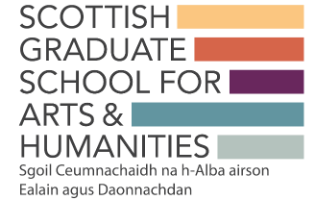Historic Environment Scotland
Published: 4 October 2023
Living Culture at Risk: Understanding at-risk intangible cultural heritage in Scotland
Location
We anticipate this internship being undertaken remotely, although there will some opportunity to travel for meetings or fieldwork.
Project
The UK, and thus by extension Scotland, is not currently party to the 2003 UNESCO Convention on Intangible Cultural Heritage (ICH). As such, support for ICH across Scotland’s public bodies is currently piecemeal, although a national agencies working group is exploring ways to better align and co-ordinate public sector support. This internship will feed into this work, by helping us to understand how we can better identify ICH at risk, and thus how we might help to better safeguard that living culture moving forward.
ICH can be at risk for any number of reasons – UNESCO have identified 46 such reasons, including lack of transmission, decontextualization, loss of objects and systems, and negative attitudes. However, as Scotland is not party to the Convention we lack any systematic approach to thinking about these risks in a Scottish context, or mechanisms for identifying risks to ICH as they emerge. The project will therefore help us to understand the main risks facing ICH in Scotland, and explore how we might improve the way we identify risks to specific forms of ICH as they emerge. To do so, it will draw on UNESCO’s ICH threats register, as well as practice currently underway across the UK and elsewhere, and interviews with key partners and ICH practitioners.
While some of the work’s recommendations will focus primarily on ICH connected to the historic environment, we anticipate the internship taking a holistic approach to ICH and producing recommendations that will support the work of other partners in the national agencies group. We are particularly keen to understand risks facing the ICH of migrant or other minority groups, especially where these groups face barriers to accessing state support.
Outputs
We are looking for the internship to produce:
- A short overview of the risks facing ICH (drawn from the material already produced by UNESCO), accompanied by a few Scottish case studies on living heritage that has fallen out of use or that might be under threat
- A summary document highlighting existing mechanisms for assessing at-risk ICH, drawn from either across Scotland and the UK (e.g. Heritage Craft Association’s red list) or international practice (e.g. practice of UNESCO ICH signatories)
- A short, written report exploring opportunities and challenges within Scotland for understanding at-risk ICH – what exists already, what structures or information channels would be needed – and particularly where and how this relates to the historic environment.
- A series of recommendations for next steps, both for HES and the historic environment sector specifically, and more generally for Scotland’s national culture agencies
Timescale
Start date (or must start by) – January 2024 but flexible
End date (or must end by) - flexible
Benefits to the Researcher
The internship will provide a chance to work alongside HES, other public sector partners, and third sector organisations to grapple with a practical and applied challenge. We hope the project will provide the intern not only with experience of applying research to practical challenges, but also leave them with direct contacts across Scotland’s public bodies, and first-hand experience of working to inform and develop cultural policy at national level.
Our team has previous experience of hosting SGSAH interns, and our last intern secured a job with a partner organisation as a direct result of their placement with us.
Key Relationships
The researcher will be based in HES’s Strategy and Policy Team, and work directly with the Research Manager, Gaelic Language Policy Manager, and the Head of Strategy and Policy. They will also work with our partners at Creative Scotland, Museums Galleries Scotland, Traditional Arts and Culture Scotland, and the Heritage Crafts Association through the course of their work, along with select ICH practitioners.
Person Specification
|
E |
D |
Essential/Desirable |
E |
D |
Essential/Desirable |
|
A1 – Knowledge Base |
C1 – Professional Conduct |
||||
|
|
|
Subject Knowledge |
|
|
Health and Safety |
|
|
|
Research methods – theoretical knowledge |
|
D |
Ethics, principles and sustainability |
|
|
|
Research methods – Practical application |
|
|
Legal requirements |
|
|
|
Information Seeking |
|
|
IPR and copyright |
|
|
|
Information literacy and management |
|
D |
Respect and confidentiality |
|
|
|
Languages |
|
|
Attribution and co-authorship |
|
|
|
Academic literacy and numeracy |
E |
|
Appropriate practice |
|
A2 – Cognitive abilities |
C2 – Research management |
||||
|
E |
|
Analysing |
|
D |
Research Strategy |
|
E |
|
Synthesising |
E |
|
Project planning and delivery |
|
E |
|
Critical thinking |
|
|
Risk management |
|
E |
|
Evaluating |
|
|
|
|
E |
|
Problem Solving |
|
|
|
|
A3 – Creativity |
C3 – Finance, funding & resources |
||||
|
|
D |
Inquiring minds |
|
|
Income and funding generation |
|
E |
|
Intellectual insight |
|
|
Financial management |
|
E |
|
Innovation |
|
|
Infrastructure and resources |
|
|
D |
Argument construction |
|
|
|
|
|
D |
Intellectual risk |
|
|
|
|
B1 – Personal qualities |
D1 – Working with others |
||||
|
E |
|
Enthusiasm |
E |
|
Collegiality |
|
E |
|
Perseverance |
E |
|
Team working |
|
E |
|
Integrity |
|
D |
People management |
|
E |
|
Self-confidence |
|
|
Supervision |
|
E |
|
Self-reflection |
|
|
Mentoring |
|
E |
|
Responsibility |
|
D |
Influence and leadership |
|
|
|
|
E |
|
Collaboration |
|
|
|
|
E |
|
Equality and diversity |
|
B2 – Self management |
D2 – Communication & dissemination |
||||
|
E |
|
Preparation and prioritisation |
E |
|
Communication methods |
|
E |
|
Commitment to research |
|
|
Communication media |
|
E |
|
Time management |
|
|
Publication |
|
E |
|
Responsiveness to change |
|
|
|
|
E |
|
Work-life balance |
|
|
|
|
B3 – Professional & career development |
D3 – Engagement and impact |
||||
|
|
|
Career management |
|
|
Teaching |
|
|
|
Continuing professional development |
|
D |
Public Engagement |
|
|
|
Responsiveness to opportunities |
|
|
Enterprise |
|
E |
|
Networking |
|
D |
Policy |
|
|
|
Reputation and esteem |
|
D |
Society and culture |
|
|
|
|
|
|
Global citizenship |
Click here to apply
First published: 4 October 2023



